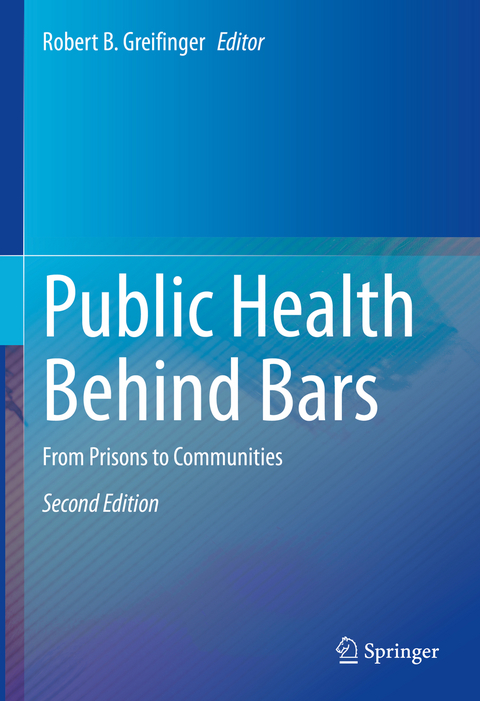
Public Health Behind Bars
Springer-Verlag New York Inc.
978-1-0716-1806-6 (ISBN)
Keeping in mind that the United States of America leads the world in the percentage of its population that is incarcerated, the book grapples with whether crime in our communities is diminished by incarcerating more and more people and whether health care behind bars could improve the health status of our communities. Special concerns arise when there are prisoners with physical or mental disabilities, who have spent long periods in segregation, and others who are simply growing old.
New to the second edition are chapters on correctional nursing, sanitation to prevent intramural transmission, transitions from prisons to communities, the European experience, and root cause analysis for quality improvement, as well as revisions/updates to more than half of the chapters from the first edition that published in 2007.
Public Health Behind Bars: From Prisons to Communities, 2nd Edition, should be of immediate interest to correctional health practitioners and correctional administrators. The text also is essential reading for civil rights attorneys, journalists, scholars whose work is at the interface of criminal justice and public health, and students of criminal justice, public health, community health, healthcare administration, health policy, civil rights law, and sociology.
"In 2007, when Robert Greifinger first compiled a trove of information about the distressing intersection of public health and incarceration, it was, he says, like a textbook for a class that didn't exist. Since then the physical and mental health care crisis in our prisons and jails has aroused a national sense of urgency, and this extensively updated collection of solutions-based essays could not be more timely. It is an invaluable resource for policy-makers, educators, reform activists – and journalists".
– Bill Keller, Founding Editor, The Marshall Project, New York, NY, USA
Robert B. Greifinger, MD is a healthcare policy and quality management consultant. His work focuses on design, management, and quality improvement in correctional healthcare systems. He has extensive experience in the development and management of complex community and institutional healthcare programs, and strengths in the bridging of clinical and public policy interests. Dr. Greifinger has published extensively in the area of correctional health care. He has been a frequent speaker on public policy, communicable disease control and quality management in corrections. Dr. Greifinger was the principal investigator for the Report to Congress on Seizing Public Health Opportunities through Correctional Health Care, published in 2002. He was Co-Editor of the International Journal of Prisoner Health from 2010 - 2016. Dr. Greifinger is the editor of Public Health Behind Bars: From Prisons to Communities (1st Edition, 2007; 2nd Edition, 2022), Springer, New York. He currently serves as the Federal Court-appointed medical monitor for the jails in Miami, Florida; New Orleans, Louisiana; and Albuquerque, New Mexico.
Impact of Law and Public Policy on Correctional Populations.- Thirty Years Since Estelle v. Gamble: Looking Forward, Not Wayward.- Impact of Incarceration on Community Public Safety and Public Health.- Litigating for Better Medical Care.- Accommodating Disabilities in Jails and Prisons.- Growing Older: Challenges of Prison and Reentry for the Aging Population.- International Public Health and Corrections: Models of Care and Harm Minimization.- The Medicalization of Execution: Lethal Injection in the United States.- Communicable Disease.- Prevention of Viral Hepatitis.- HIV Prevention: Behavioral Interventions in Correctional Settings.- Prevention and Control of Tuberculosis in Correctional Facilities.- Controlling Chlamydia, Gonorrhea, and Syphilis Through Targeted Screening and Treatment in Correctional Settings.- Primary and Secondary Prevention.- Health Promotion in Jails and Prisons: An Alternative Paradigm for Correctional Health Services.- Screening for Public Purpose: Promotingan Evidence-based Approach to Screening of Inmates to Improve Public Health.- Written Health Informational Needs for Reentry.- Reducing Inmate Suicides Through the Mortality Review Process.- Blinders to Comprehensive Psychiatric Diagnosis in the Correctional System.- Juvenile Corrections and Public Health Collaborations: Opportunities for Improved Health Outcomes.- Female Prisoners and the Case for Gender-Specific Treatment and Reentry Programs.- Building the Case for Oral Health Care for Prisoners: Presenting the Evidence and Calling for Justice.- Tertiary Prevention.- Treatment of Mental Illness in Correctional Settings.- Treatment and Reentry Approaches for Offenders with Co-occurring Disorders.- Pharmacological Treatment of Substance Abuse in Correctional Facilities: Prospects and Barriers to Expanding Access to Evidence-Based Therapy.- Thinking Forward to Reentry—Reducing Barriers and Building Community Linkages.- Health Research Behind Bars: A Brief Guide to Research in Jails andPrisons.- Reentry Experiences of Men with Health Problems.- Providing Transition and Outpatient Services to the Mentally Ill Released from Correctional Institutions.- Sexual Predators: Diversion, Civil Commitment, Community Reintegration, Challenges, and Opportunities.- Electronic Health Records Systems and Continuity of Care.- Community Health and Public Health Collaborations.- Improving the Care for HIV-Infected Prisoners: An Integrated Prison-Release Health Model.
“Greifinger and collaborators yet again aid in empowering correctional professionals, linking correctional health care with public health and community health providers, and increasing the health literacy and ethical knowledge of correctional and health administrators and policymakers. All readers will benefit from better understanding jail, prison, and community health systems … . This 2022 edition is of particular interest to researchers; practitioners; and others interested in correctional health and medicine; criminology … .” (David Satcher, Journal of Correctional Health Care, Vol. 29 (6), 2023)
| Erscheinungsdatum | 29.10.2021 |
|---|---|
| Zusatzinfo | 9 Illustrations, color; 2 Illustrations, black and white; XXIII, 520 p. 11 illus., 9 illus. in color. |
| Verlagsort | New York, NY |
| Sprache | englisch |
| Maße | 178 x 254 mm |
| Themenwelt | Studium ► Querschnittsbereiche ► Prävention / Gesundheitsförderung |
| Recht / Steuern ► Strafrecht ► Kriminologie | |
| Sozialwissenschaften ► Politik / Verwaltung | |
| ISBN-10 | 1-0716-1806-7 / 1071618067 |
| ISBN-13 | 978-1-0716-1806-6 / 9781071618066 |
| Zustand | Neuware |
| Informationen gemäß Produktsicherheitsverordnung (GPSR) | |
| Haben Sie eine Frage zum Produkt? |
aus dem Bereich


